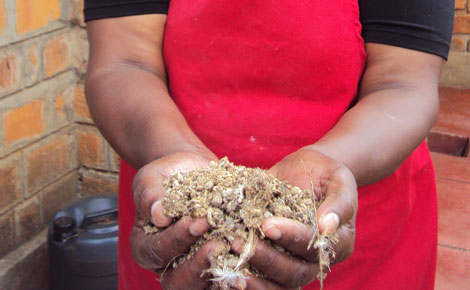By Nikko Tanui
Kericho, Kenya: Miriam Cheruiyot’s lush garden of traditional sagek vegetables is breathtaking. Fellow villagers in Chebaon in Kericho County admire the sagek leaves as they sway with the wind and long for a piece of the same in their shambas.
Cheruiyot, 47, is happy to reveal the secret she accidentally discovered that makes her garden an envy of many. She mixes quails’ droppings with ash to get magic fertiliser that has transformed her farming for the better and boosted her produce.
“Ash is a traditional disinfectant and I used it and to prevent the quails’ droppings from smearing the floor of my house, I would sprinkle ash on them and sweep and throw the rubbish in the garden. Soon, I noticed that my sagek garden was getting greener and the leaves larger,” says Cheruiyot, who keeps 2,000 quails.
She began experimenting more with the new fertiliser by mixing more quantities of the birds’ droppings with ash and used it to plant more of the traditional vegetable. She was pleased by how they responded to the fertiliser.
“It has turned out to be the best organic fertiliser I have ever used,” Cheruiyot says.
Better still, she says her traditional vegetable garden is no longer attacked by cut worms and other pests which used to destroy the vegetable.
She earns an average of Sh300 from the sale of the vegetable from the tiny patch of garden. Now buoyed by the demand, she intends to expand it.
“I planted the vegetables just for family consumption but with the growing demand, I have plans of extending the garden for commercial purposes.”
And the vegetable is popular among breastfeeding women. It is believed that sagek makes them produce more breast milk.
To make it even tastier, says Cheruiyot, milk cream is added and since the vegetable has no heartburn, even the elderly love it.
Cheruiyot, a 1998 Guinness Stout Award winner for humanitarian work, says word of mouth has caused neighbours to flock to her house to buy the organic fertiliser which she sells at Sh200 per sack.
“In a month I can sell at least ten bags of the organic fertiliser and the demand is growing day by day,” she says. More and more people have found out that the organic matter is good for other traditional vegetables as well.
Besides the organic fertiliser, Cheruiyot recycles the waste into chicken and cattle feed since the birds only digest 50 per cent of their food.
 The Standard Group Plc is a multi-media organization with investments in media
platforms spanning newspaper print operations, television, radio broadcasting,
digital and online services. The Standard Group is recognized as a leading
multi-media house in Kenya with a key influence in matters of national and
international interest.
The Standard Group Plc is a multi-media organization with investments in media
platforms spanning newspaper print operations, television, radio broadcasting,
digital and online services. The Standard Group is recognized as a leading
multi-media house in Kenya with a key influence in matters of national and
international interest.
 The Standard Group Plc is a multi-media organization with investments in media
platforms spanning newspaper print operations, television, radio broadcasting,
digital and online services. The Standard Group is recognized as a leading
multi-media house in Kenya with a key influence in matters of national and
international interest.
The Standard Group Plc is a multi-media organization with investments in media
platforms spanning newspaper print operations, television, radio broadcasting,
digital and online services. The Standard Group is recognized as a leading
multi-media house in Kenya with a key influence in matters of national and
international interest.










